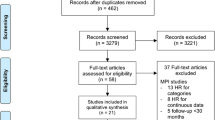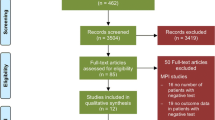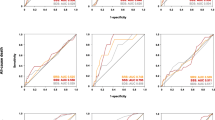Abstract
Purpose
This meta-analysis summarized the accuracy of stress myocardial perfusion scintigraphy (MPS) and stress echocardiography for the diagnosis of coronary artery disease (CAD) in patients with arterial hypertension.
Methods
We searched for studies in which stress MPS or stress echocardiography were performed to detect CAD in hypertensive patients, with coronary angiography used as the reference test, published from January 1980 to December 2010. Studies performed in patients with known CAD, acute coronary syndrome and previous revascularization procedures were excluded.
Results
Of 1,263 studies, 13 met the inclusion criteria. Pooled summary estimates showed that stress MPS had a sensitivity of 0.90 [95% confidence interval (CI) 0.82–0.95] and a specificity of 0.63 (95% CI 0.53–0.72). For stress MPS, the area under the curve (AUC) at the summary receiver-operating characteristic (SROC) graph was 0.83 (95% CI 0.80–0.86). At meta-regression analysis, the presence of positive stress electrocardiography as inclusion criterion was the only significant effect modifier (p < 0.01). Pooled summary estimates showed that stress echocardiography had a sensitivity of 0.77 (95% CI 0.69–0.83) and a specificity of 0.89 (95% CI 0.83–0.93). For stress echocardiography, the AUC at SROC was 0.91 (95% CI 0.88–0.93). At the meta-regression analysis no significant effect modifier was detected.
Conclusion
MPS has high sensitivity for detecting CAD in hypertensive patients, with specificity comparable to that reported in the general population, whereas stress echocardiography shows higher specificity but substantially reduced sensitivity compared to MPS.







Similar content being viewed by others
References
Picano E, Pálinkás A, Amyot R. Diagnosis of myocardial ischemia in hypertensive patients. J Hypertens 2001;19:1177–83.
Petretta M, Costanzo P, Acampa W, Imbriaco M, Ferro A, Filardi PP, et al. Noninvasive assessment of coronary anatomy and myocardial perfusion: going toward an integrated imaging approach. J Cardiovasc Med (Hagerstown) 2008;9:977–86.
Kuettner A, Trabold T, Schroeder S, Feyer A, Beck T, Brueckner A, et al. Noninvasive detection of coronary lesions using 16-detector multislice spiral computed tomography technology: initial clinical results. J Am Coll Cardiol 2004;44:1230–7.
Perrone-Filardi P, Cuocolo A, Brevetti G, Silvestro A, Storto G, Dellegrottaglie S, et al. Relation of artery flow-mediated vasodilation to significant coronary artery disease in patients with peripheral arterial disease. Am J Cardiol 2005;96:1337–41.
Pellegrino T, Storto G, Perrone-Filardi P, Sorrentino AR, Silvestro A, Petretta M, et al. Relationship between brachial artery flow-mediated dilation and coronary flow reserve in patients with peripheral artery disease. J Nucl Med 2005;46:1997–2002.
Indolfi C, Piscione F, Perrone-Filardi P, Prastaro M, Di Lorenzo E, Saccà L, et al. Inotropic stimulation by dobutamine increases left ventricular regional function at the expense of metabolism in patients with hibernating myocardium. Am Heart J 1996;132:542–9.
Stroup DF, Berlin JA, Morton SC, Olkin I, Williamson GD, Rennie D, et al. Meta-analysis of observational studies in epidemiology: a proposal for reporting. Meta-analysis of Observational Studies in Epidemiology (MOOSE) group. JAMA 2000;283:2008–12.
Bossuyt PM, Reitsma JB, Bruns DE, Gatsonis PP, Glasziou PP, Irwig LM, et al. The STARD statement for reporting of diagnostic accuracy: explanation and elaboration. Clin Chem 2003;49:7–18.
Devillé WL, Buntinx F, Bouter LM, Montori VM, de Vet HC, van der Windt DA, et al. Conducting systematic reviews of diagnostic studies: didactic guidelines. BMC Med Res Methodol 2002;2:9.
Petretta M, Costanzo P, Perrone-Filardi P, Chiariello M. Impact of gender in primary prevention of coronary heart disease with statin therapy: a meta-analysis. Int J Cardiol 2010;138:25–31.
Whiting PF, Weswood ME, Rutjes AWS, Reitsma JB, Bossuyt PM, Kleijnen J. Evaluation of QUADAS, a tool for the quality assessment of diagnostic accuracy studies. BMC Med Res Methodol 2006;6:9.
Costanzo P, Perrone-Filardi P, Vassallo E, Paolillo S, Cesarano P, Brevetti G, et al. Does carotid intima-media thickness regression predict reduction of cardiovascular events? A meta-analysis of 41 randomized trials. J Am Coll Cardiol 2010;56:2006–20.
Leemis LM, Trivedi KS. A comparison of approximate interval estimators for the Bernoulli parameter. Am Stat 1996;50:63–8.
Higgins JP, Thompson SG, Deeks JJ, Altman DG. Measuring inconsistency in meta-analyses. BMJ 2003;327:557–60.
Reitsma JB, Glas AS, Rutjes AW, Scholten RJ, Bossuyt PM, Zwinderman AH. Bivariate analysis of sensitivity and specificity produces informative summary measures in diagnostic reviews. J Clin Epidemiol 2005;58:982–90.
Zwinderman AH, Bossuyt PM. We should not pool diagnostic likelihood ratios in systematic reviews. Stat Med 2008;27:687–97.
Egger M, Davey Smith G, Schneider M, Minder C. Bias in meta-analysis detected by a simple, graphical test. BMJ 1997;315:629–34.
Astarita C, Pálinkás A, Nicolai E, Maresca FS, Varga A, Picano E. Dipyridamole-atropine stress echocardiography versus exercise SPECT scintigraphy for detection of coronary artery disease in hypertensives with positive exercise test. J Hypertens 2001;19:495–502.
Aggeli C, Christoforatou E, Giannopoulos G, Roussakis G, Kokkinakis C, Barbetseas J, et al. The diagnostic value of adenosine stress-contrast echocardiography for diagnosis of coronary artery disease in hypertensive patients: comparison to Tl-201 single-photon emission computed tomography. Am J Hypertens 2007;20:533–8.
Astarita C, Nicolai E, Liguori E, Gambardella S, Rumolo S, Maresca FS. Dipyridamole-echocardiography and thallium exercise myocardial scintigraphy in the diagnosis of obstructive coronary or microvascular disease in hypertensive patients with left ventricular hypertrophy and angina. G Ital Cardiol 1998;28:996–1004.
Lu C, Lu F, Fragasso G, Dabrowski P, Di Bello V, Chierchia SL, et al. Comparison of exercise electrocardiography, technetium-99m sestamibi single photon emission computed tomography, and dobutamine and dipyridamole echocardiography for detection of coronary artery disease in hypertensive women. Am J Cardiol 2010;105:1254–60.
Elhendy A, Geleijnse L, van Domburg RT, Bax JJ, Nierop PR, Beerens SA, et al. Comparison of dobutamine stress echocardiography and technetium-99m sestamibi single-photon emission tomography for diagnosis of coronary artery disease in hypertensive patients with and without left ventricular hypertrophy. Eur J Nucl Med 1998;25:69–78.
Elhendy A, van Domburg RT, Sozzi FB, Poldermans D, Bax JJ, Roelandt JR. Impact of hypertension on the accuracy of exercise stress myocardial perfusion imaging for the diagnosis of coronary artery disease. Heart 2001;85:655–61.
Fragasso G, Lu C, Dabrowski P, Pagnotta P, Sheiban I, Chierchia SL. Comparison of stress/rest myocardial perfusion tomography, dipyridamole and dobutamine stress echocardiography for the detection of coronary disease in hypertensive patients with chest pain and positive exercise test. J Am Coll Cardiol 1999;34:441–7.
Massie BM, Szlachcic Y, Tubau JF, O’Kelly BF, Ammon S, Chin W. Scintigraphic and electrocardiographic evidence of silent coronary artery disease in asymptomatic hypertension: a case-control study. J Am Coll Cardiol 1993;22:1598–606.
Picano E, Lucarini AR, Lattanzi F, Distante A, Di Legge V, Salvetti A, et al. Dipyridamole echocardiography in essential hypertensive patients with chest pain. Hypertension 1988;12:238–43.
Prisant LM, von Dohlen TW, Houghton JL, Carr AA, Frank MJ. A negative thallium (± dipyridamole) stress test excludes significant obstructive epicardial coronary artery disease in hypertensive patients. Am J Hypertens 1992;5:71–5.
Schillaci O, Moroni C, Scopinaro F, Tavolaro R, Danieli R, Bossini A, et al. Technetium-99m sestamibi myocardial tomography based on dipyridamole echocardiography testing in hypertensive patients with chest pain. Eur J Nucl Med 1997;24:774–8.
Michaelides AP, Tousoulis D, Fourlas CA, Vyssoulis GP, Andrikopoulos GK, Aznaouridis KA, et al. Hypertensive patients with false-positive thallium-201 scintigraphic results in the infero-posterior wall are in high risk for coronary artery disease development. Int J Cardiol 2007;117:178–83.
Cortigiani L, Bigi R, Rigo F, Landi P, Baldini U, Mariani PR, et al. Diagnostic value of exercise electrocardiography and dipyridamole stress echocardiography in hypertensive and normotensive chest pain patients with right bundle branch block. J Hypertens 2003;21:2189–94.
Giangrossi R, Detrano R, Mulvihill D, Lehmann K, Dubach P, Colombo A, et al. Exercise-induced ST depression in the diagnosis of coronary artery disease. A meta-analysis. Circulation 1989;80:87–98.
Fox K, Garcia MA, Ardissino D, Buszman P, Camici PG, Crea F, et al. Guidelines on the management of stable angina pectoris: executive summary: The Task Force on the Management of Stable Angina Pectoris of the European Society of Cardiology. Eur Heart J 2006;27:1341–81.
Smart SC, Knickelbine T, Malik F, Sagar KB. Dobutamine-atropine stress echocardiography for the detection of coronary artery disease in patients with left ventricular hypertrophy. Importance of chamber size and systolic wall stress. Circulation 2000;101:258–63.
Geleijnse ML, Elhendy A. Can stress echocardiography compete with perfusion scintigraphy in the detection of coronary artery disease and cardiac risk assessment? Eur J Echocardiogr 2000;1:12–21.
Camici PG, Crea F. Coronary microvascular dysfunction. N Engl J Med 2007;356:830–40.
Lucarini AR, Picano E, Lattanzi F, Camici P, Marini C, Salvetti A, et al. Dipyridamole echocardiography stress testing in hypertensive patients. Targets and tools. Circulation 1991;83(5 Suppl):III68–72.
Virdis A, Ghiadoni L, Lucarini A, Di Legge V, Taddei S, Salvetti A. Presence of cardiovascular structural changes in essential hypertensive patients with coronary microvascular disease and effects of long-term treatment. Am J Hypertens 1996;9:361–9.
Shaw LJ, Berman DS, Maron DJ, Mancini GB, Hayes SW, Hartigan PM, et al. Optimal medical therapy with or without percutaneous coronary intervention to reduce ischemic burden: results from the Clinical Outcomes Utilizing Revascularization and Aggressive Drug Evaluation (COURAGE) trial nuclear substudy. Circulation 2008;117:1283–91.
Pace L, Perrone-Filardi P, Mainenti PP, Cuocolo A, Vezzuto P, Prastaro M, et al. Identification of viable myocardium in patients with chronic coronary artery disease using rest-redistribution thallium-201 tomography: optimal image analysis. J Nucl Med 1998;39:1869–74.
Conflicts of interest
None.
Author information
Authors and Affiliations
Corresponding authors
Rights and permissions
About this article
Cite this article
Gargiulo, P., Petretta, M., Bruzzese, D. et al. Myocardial perfusion scintigraphy and echocardiography for detecting coronary artery disease in hypertensive patients: a meta-analysis. Eur J Nucl Med Mol Imaging 38, 2040–2049 (2011). https://doi.org/10.1007/s00259-011-1891-0
Received:
Accepted:
Published:
Issue Date:
DOI: https://doi.org/10.1007/s00259-011-1891-0




